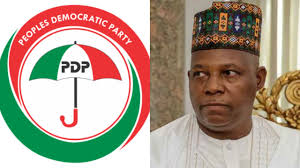
By Ifeanyi Igwebike Mbanefo
I made a post expressing disgust with the Supreme Court Judgment on Peoples Democratic Party (PDP’s) case with Shettima. That outcome was predictable. It holds up in law if you belong to the camp that won the case.
My worry was not the judgment, predictable as it was.

I was disappointed that it fits smugly into what has become a pattern since judges were intimidated and their houses raided; since the Chief Justice of Nigeria (CJN) was illegally removed.
We have seen judgments going to the big man. That is the origin of the infamous statement “go to court”. It suggests state capture.
Let’s be clear: Justices may have different intellectual approaches to legal issues, but partisanship is a threat to the rule of law.
Under the bedrock constitutional democracy, citizens must have a say in the process of choosing their leaders. Limiting that right through locus or jurisdiction is something the justices should have cured.
You can’t shut the gate to the public.
Advocates with different views on this issue have the right to, and will, voice their opinions. Peacefully expressing a view is protected by the law. So long as there is no violence.
By this unfortunate ruling, the Supreme Court failed to protect the citizens’ rights to inquire into how leaders are selected. My concern is not who won or who lost because in the end we are all losers.
The Supreme Court has failed to protect a right that is an essential component of democracy.
This decision deals a devastating blow to democratic freedom in Nigeria. It will have an immediate and irreversible impact on the nomination and election process across the country. And it will be greatly disproportionate in its effect – with the greatest burdens felt by those of limited financial means. See how Umahi, Akpabio and Lawan sailed through.
The ability to hold officials to account is a fundamental value, and few decisions are more significant and personal than the choice of the President and Vice President. Otherwise, why this long and rolling national drama and spectacle?
The court acquires its legitimacy as the final arbiter of difficult disputes not from legal expertise alone, but also from public confidence in the independence, objectivity, and fairness of its decisions. A court that consistently adopts partisan positions with the ruling party transforms itself into just another legislature engaged in partisan politics.
The Constitution grants only those rights that the Supreme Court says it grants. Forced changes with new partisan entrants/judges can and will bestow those rights, and take them away, in chilling ways.
The judiciary can be a moderating force against extreme swings in legislation and politics, especially the snatch-it-and-run-with-it brand of politics.
What I expected was that it will either refer the matter back for retrial, refer the matter to the tribunal.
Sometimes the Supreme Court makes a call to preserve social order and to not deepen public cynicism. Loss of public confidence will erode its powers
The big lawyer can teach me the law. But he can’t teach me justice.
This is not justice.




GIPHY App Key not set. Please check settings